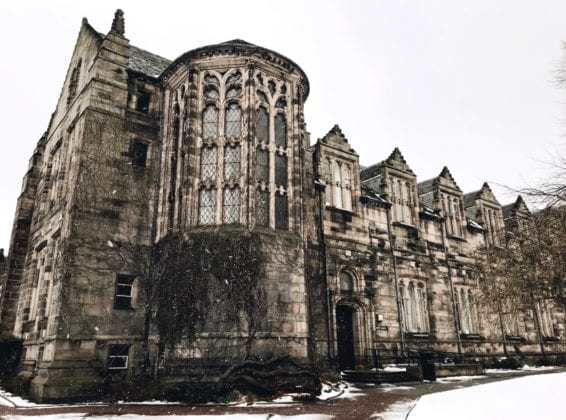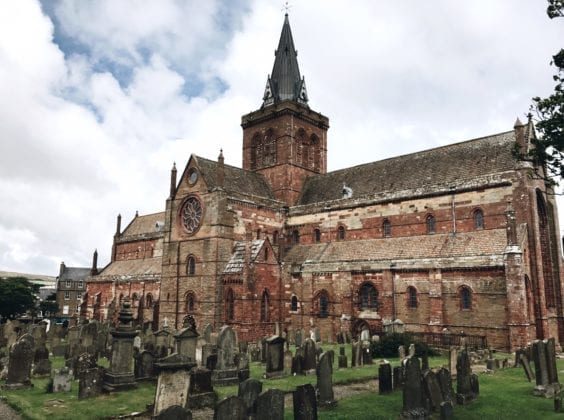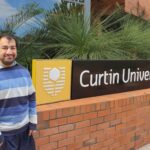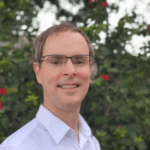Atop a small hill in Orkney, a town in the Northern Isles of Scotland, pink flowers sprout from the middle of a neat hedge. This idyllic sight belies the horrific events that occurred there during the 17th century – the execution of numerous women accused of witchcraft.
Ashleigh Angus is a Curtin PhD student unearthing this significant period in Scottish history through a work of historical fiction that explores the lives of Orkney women condemned to death for ‘consorting with fairies’.
“My PhD project investigates the relationship between women, witches, and fairy belief in 17th century Orkney, Scotland. I am currently producing a prose work based on six different witch trials from Orkney in which women confess to having a relationship with the fairy folk.
“My research attempts to grasp the voices of these women and explore how they may have drawn upon fairy folklore to articulate certain events, hopes, and fears,” Angus says.
Angus is currently undertaking her PhD at the University of Aberdeen in Scotland through the Aberdeen-Curtin Alliance PhD Scholarships program. The program enables students from Curtin and Aberdeen to conduct part of their PhD project at the partner university and gain access to different resources, knowledge and perspectives to utilise in their research.
“I had already researched Scottish literature and history as part of my Honours in creative writing at Curtin, so when I came across the alliance program, it seemed like too perfect an opportunity to pass up,” Angus says.
“Spending one year abroad at Aberdeen through this program will allow me access to texts unavailable in Australia. I will have the opportunity to travel to the archives in Edinburgh and Orkney to study witch trial records, as well as access rare books in Aberdeen’s own university library.
“I will also be able to travel regularly to Orkney to take note of its landscape, which is essential to the completion of my creative work.”

Rachel Robertson, Senior Lecturer within the School of Media, Creative Arts and Social Inquiry at Curtin, says the alliance has produced a wealth of creativity for all students involved.
“An experience studying at another university in another continent is a great opportunity for our students. Being a stranger in a new place is a wonderful creative impetus and helps us see new things, think more laterally and write more imaginatively.
“The University of Aberdeen is 500 years old and Aberdeen itself is quite different from Perth, with its granite buildings, ancient traditions and rather cold winter weather! It can be challenging to work on a PhD overseas, but also very rewarding.”

When Angus arrived in Aberdeen in February 2018, it was indeed one of the coldest winters the city had ever experienced, but she wasted no time in settling in. One of the highlights of her trip so far, she says, was winning the university’s Literary Lights creative writing competition.
Sponsored by the Lewis Grassic Gibbon Centre, Literary Lights is open to all students of Aberdeen University, and invites participants to submit a work of fiction or creative non-fiction that explores the themes of time and change.
“My piece, Unknown, Unknown, death c 1629 was inspired by an entry in the Scottish Survey of Witchcraft, an online database which records the names and trial details of accused witches throughout Scotland. In the section on Orkney, one witch is listed as Unknown, Unknown, executed 1629,” Angus says.
“I was inspired by this unidentified figure, as well as the fact that in Orkney today, on the hill where those accused of witchcraft were strangled and burnt, all those murdered men and women remain nameless. There is no plaque or memorial for those executed.”

Witch trials and witch hunts occurred throughout Western Europe and its North American colonies as a response to a perceived organised threat to Christianity. Between the 16th and 18th centuries, it is estimated that 40,000 to 60,000 people, mostly women, were executed for witchcraft.
While these events occurred hundreds of years ago, Angus says the silencing of marginalised women is still very much relevant today.
“The term ‘witch hunt’ has appeared a lot lately, particularly in the backlash against the Me Too and Times Up movements. It is a dismissal, made to discourage women from speaking,” she says.
“In Orkney’s witch trials, the persecuted women were those who had often said too much – they were women who roamed the streets telling people’s futures, making unwanted predictions, demanding money, or cursing their neighbours. So, it is interesting that the term ‘witch hunt’ has been adopted once more as a way of silencing women.”
Angus hopes that her PhD research will add to the cultural and literary knowledge of witch trials and offer new narratives of Orkney’s history.
“I hope to give voice to Orkney’s early modern women, who have been marginalised by history, much as they were through life.”
Find out more about the Aberdeen-Curtin Alliance PhD Scholarships program.



